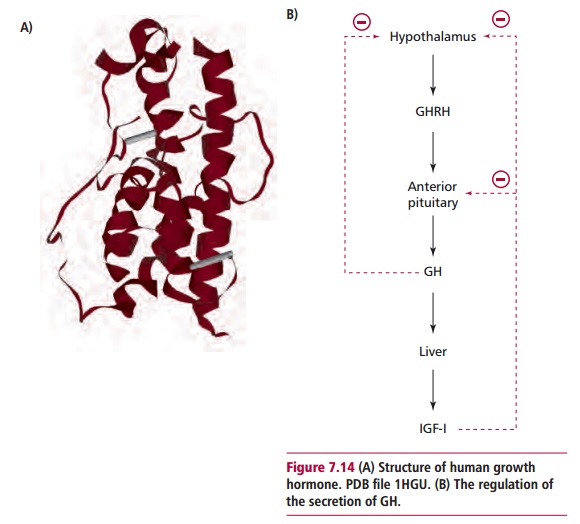Chapter: Biology of Disease: Disorders of the Endocrine System
Diagnosis and Treatment of Growth Hormone Disorders

DIAGNOSIS AND TREATMENT OF GROWTH HORMONE DISORDERS
A variety of tests are used to assess GH deficiency. Random measurements of serum GH are of limited value due to fluctuations in plasma GH levels in normal individuals. Urinary GH excretion is low in deficiency but obtaining an accurately timed collection of urine is difficult. Most tests rely on demonstrating that the hormone does not increase in concentration following a stimulus. Growth hormone increases after exercise and this has been used as a preliminary screening test. In the exercise test, the patient is subjected to hard physical exercise until they have a pulse rate greater than 150 beats per min . Blood is collected at 0, 2 and 20 min after stopping exercise. In normal individuals, the plasma concentration of GH increases by 20 mU dm–3 above the initial value. Growth hormone release increases during sleep, hence high values in a nocturnal sample may exclude deficiency. Blood samples are collected using a venous catheter at 30 min intervals for 3 to 4 h after the onset of sleep. A peak of at least 10 mU dm–3 occurs in normal individuals but not in patients with GH deficiency. Clonidine is a potent stimulator of GH secretion and is used in a definitive test for GH deficiency. Growth hormone from genetically engineered sources is used in treatment but must be continued until longitudinal growth is completed. In cases where deficiency is due to low levels of GHRH, analogs of this peptide, for example hexarelin, have been used.
A diagnosis of excess GH is made on clinical grounds supported by biochemical and radiological investigations. Photographs taken of the patient when younger are particularly useful when making a diagnosis. Basal serum concentrations of GH are increased in GH excess but, because release is influenced by so many factors, the result of a single sample is unreliable.
The concentration of IGF-I in serum is raised in patients with acromegaly and is of diagnostic significance. The oral glucose tolerance test (OGTT) is used to confirm a diagnosis of acromegaly and is similar to that used for diagnosis of diabetes mellitus except that levels of plasma GH are also determined. In a healthy individual, the glucose load suppresses GH release to below 2 mU dm–3 by stimulating the release of somatostatin. In patients with acromegaly, this suppression is not seen.

The management of GH excess cannot reverse any clinical changes that have taken place prior to treatment. However, management is important because it improves survival and reduces deaths due to heart disease or stroke. Growth hormone secreting tumors are treated in one of three ways, the clinical decision depending on severity of disease, the age of the patient and the response to treatment. Surgical removal of the pituitary tumor may be attempted depending on its size and location with steps taken to minimize damage to the anterior pituitary. If GH levels do not normalize, other treatments must be considered. Radiotherapy is usually performed over a 4–6 week period by external irradiation using a cobalt source. Its effects are slow and, in some cases, hyposecretion of other pituitary hormones may occur. Drugs, such as bromocriptine, suppress GH release in acromegalics and are often used in patients too old to undergo surgery or radiotherapy. Somatostatin analogs, for example octeotride, have also been used to inhibit GH release. Some patients require all three modes of treatment but are not always successfully treated. To detect recurrence, serum IGF-I needs to be monitored at regular intervals.
Related Topics